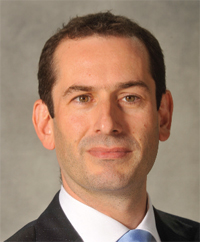

- Matthew Davies
- Head of Global Transaction Services EMEA, Global Co-Head of Corporate Sales GTS, Bank of America
by Matthew Davies, Co-Head of EMEA Product Management, Global Transaction Services, Bank of America Merrill Lynch
 Over the last few years, corporates have been looking for more innovative ways to reduce cost and streamline their treasury operations. One of the main opportunities that treasuries have been exploring is centralising operations thereby leveraging economies of scale, and at the same time maximising their working capital through a centralised treasury function. SEPA has been a key enabler in assisting companies on this journey; however, as it only eliminated borders for euro payments, there were still additional currencies and challenges that corporate treasurers need addressed. Ultimately, SEPA has been a catalyst for change, making corporates think in a new way about how they could rationalise and centralise their treasury operations and it has enabled other solutions to be introduced to further streamline receivables and payments - Virtual Account Management (VAM).
Over the last few years, corporates have been looking for more innovative ways to reduce cost and streamline their treasury operations. One of the main opportunities that treasuries have been exploring is centralising operations thereby leveraging economies of scale, and at the same time maximising their working capital through a centralised treasury function. SEPA has been a key enabler in assisting companies on this journey; however, as it only eliminated borders for euro payments, there were still additional currencies and challenges that corporate treasurers need addressed. Ultimately, SEPA has been a catalyst for change, making corporates think in a new way about how they could rationalise and centralise their treasury operations and it has enabled other solutions to be introduced to further streamline receivables and payments - Virtual Account Management (VAM).
Before the introduction of virtual accounts, every legal entity within a corporate may have managed a multitude of accounts. With a VAM solution, companies gain the ability to establish a multi-level hierarchy of virtual accounts within their account structure at Bank of America Merrill Lynch that reflects their operations or business relationships. Unique virtual account numbers can be used to segregate payments and receipts per entity, or even per trading partner or customer if more detailed reconciliation is needed. The VAM solution not only opens a unique virtual account but it also hosts the virtual account details (sort code, account number and international bank account number) in a structure that is clearing recognisable.
Corporates can use these virtual account details as the settlement instructions for payments and also provide them out in the market as instructions for receipts. Companies benefit from having more control over the data used for reconciliation purposes. Similarly, for payments being intiated quoting the virtual account number, the details of the virtual account can be carried over into the market, ensuring that the end client or beneficiary has the same level of data. As multiple virtual accounts can be attached to a single physical bank account, corporates have the opportunity to minimise the number of physical accounts they need to maintain while receiving enhanced information.
VAM solutions can streamline the way business is conducted as treasuries now have the opportunity to rationalise all their activities and create structures that pull together all of an organisation’s systems. The reporting and reconciliation provided through VAM and the ability to customise depending on the varying individual requirements, give corporates more control. The company can set up cash-flow structures in a way that supports its own business functions. As a result, corporates have clearing recognisable virtual accounts, which they can fund through standard market options and quote when they request that a company makes payments on their behalf. Self-service capabilities and all reporting are run near real-time, providing corporates and their clients with timely access, on their screen, to the latest balance information.
The benefits of virtual accounts can extend beyond accounts payable/receivable. The full capabilities of VAM can include additional visibility, liquidity management, consistency of reporting, and operational cost efficiency and reconciliation through standardisation and automation — all through one physical account that is safe, secure and controlled by authorisation processes and access rights. Additionally, we see VAM solutions offering corporates with less sophisticated ERP systems a plug-and-play platform that will help them leap into treasury operations in future years as they do not have to rely on ERP providers or invest in new technology at their end.
VAM is a flexible solution offering treasurers tools to streamline their processes regardless of their industry. In recent years we have been working with corporates on innovative treasury solutions such as VAM, and we have already seen more traction from large and small corporates in Asia Pacific and EMEA. We are looking to bring these advances together in a global model so that corporates can benefit from a solution across all regions. We also expect that new currencies will be added in the future and that new enhancements will be made to reporting. As we look ahead, we expect more and more forward-thinking treasurers to explore the benefits of adopting VAM. The efficiencies it enables are expanding on many levels and we look forward to helping corporates discover and take advantage of these opportunities.









